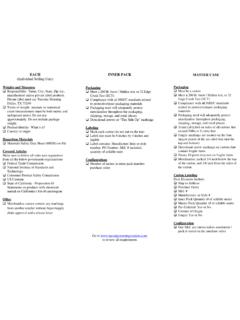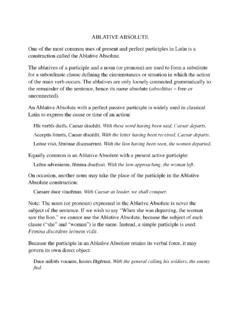Transcription of INNER and OUTER Characteristics
1 INNER and OUTER Characteristics The need for the actor to develop an INNER Life The first realisation that we have to make is that we are not who we appear to be, what we say is not as important as the meaning behind it. We are not one dimensional beings, but there are at least two dimensions to any one of us: one OUTER and one A very simplistic way to define such dimensions is through Characteristics OUTER Characteristics are to do with how a character presents himself to other people/situations, and/or how the character wants others to perceive him. What they say and how they appear to be saying it. These are most obvious to the listener. And are easily found when reading a script. INNER Characteristics are to do with a particular condition that determines the reason why a character presents himself to other people/situations in a certain way. What lies behind an OUTER appearance of the way something is communicated. What hides behind an OUTER characteristic. Why they say it.
2 And/or what they are thinking as they are saying it. INNER Life Every actor needs one. For the following reasons: 1 Character s thought process should be kept alive just as we do in real life. In life it has become known that we don t generally tend to listen to others and are lucky at anytime to retain only about 10/20% of what we hear because most time is spent elaborating our INNER Monologue the voice in our head that talks to us while others are talking. Our INNER monologue constantly: judges, compares, and formulates opinions all the time on what is being said often before someone has even finished talking. It seems ironic to me therefore that when an actor learns his lines he forgets to learn not only what it is said, but also what one is thinking when one speaks. Give an actor lines to say and he immediately forgets the relevance of thinking and the thought process, or even worse his mind is filled with irrelevant thoughts such as: I am so nervous!
3 , I wonder how many people are in tonight, I was better last night, who is coming to see me tomorrow, who s fucking mobile just went off, what is my etc. etc. (EXAMPLE Back 2 Cowboys and Indians u should be there because you love to play. Method v. Straight) 2 What interest us all is what lies behind the words we we all know that it is not what you say but how you say it or what you really mean that counts. 3 Greater Connection. Connection, simply put, is the actor allowing his or her vital systems ( INNER life) to be activated by the surrounding world. As with any experience, connection must begin with a receptive mind. An actor must be connected to every other actor in the play, but he or she can, and quite often must, connect with another actor who is connected to no one - not even himself. Whether it is to your own intuition or to, another actor on stage, or with your audience .. if there isn't a sense of being connected to yourself, you have little chance to really connect to ever!
4 4 Experiencing the INNER life of the other actor not only enhances the flow of actor to actor, but extends to the performance and the audience. The audience wants to experience the actor's INNER life first, because the whole internal life of the audience comes alive only when they can experience the INNER life in the actors. An audience will switch on their INNER life only what the actor switches his on . The actor's INNER life grows from all experiences on stage, and he is able to process more than he did before the performance began. And give the actor the chance to grow wiser with each performance. When he experiences more, then also the audience will become more alive to the world around them, and they will become more conscious of their own experiences and all thanks to and because of the actor's art. So all of you who want to become actors in order to change the world beware, it s about really feeling something deeply for yourselves first before others will 5 Greater Empathy.
5 An actor must be very serious about his art to have the courage to be empathetic. Empathy requires receptivity. And receptivity requires that your INNER Life be switched ON. For example; if the actor is communicating with a beggar on the streets, and he actually allows his own vital systems to become activated by the same conditions, in the same way that the beggar experiences those conditions. The actor does not just connect with the beggar, or become intimate, he allows himself to experience life as the beggar experiences it. The actor, to a certain extent, then becomes the beggar. We therefore have a chance to really become who we pretend to be if our INNER Life is switched on. 6 A wonderful array of stimuli/impulses can germinate from an actor's fertile INNER life; the actor's experiences then spontaneously flow into behaviour, and help dictate what to say/do next. INNER Life opens the actor to more spontaneous interaction and not a premeditated and sterile one.
6 It gives you a more natural way of RE-Acting to people and situations. (Expand) 7 AND ultimately it is the INNER life and thought process that determines the type of character that one For : INNER OUTER Character 1 Vain Arrogant Character 2 Insecure Reserved BUT ALSO Character 3 Insecure Arrogant Character 4 Secure Reserved Notice that some Characteristics are actually opposites! A careful examination of INNER Characteristics therefore constitutes an essential part of the actor s homework. What to do???? Observing yourself in everyday life, you should make your own list of INNER and OUTER Characteristics . As a useful exercise in self-analysis and self awareness. (When we meet and greet different people, and we interact with the world around us, including our parents, friends, colleagues, lovers, etc. make your own list) I already mentioned self awareness, which is very important to the actor.
7 Self-Awareness, whether it is Stansislavsky, Meisner, Lee Strasberg, Grotowski or Michael Chekov, most teachers of Acting will agree, that knowing yourself is an essential part of the process. And part of this self-awareness has to focus on what Stanislavski called "the INNER creative mood," a synthesis of body, mind, and spirit. Self awareness should therefore be at the heart of every actor training. Self-awareness is at the heart of almost any spiritual discipline and it is also at the heart of acting because without it you can't really develop the quality of listening. And by paying attention to your INNER Life you will notice a great improvement in your Interactions with Lovers, parents, When working on a character you should make the character s list of INNER and OUTER Characteristics ; then you must compare the two lists: any discrepancies should become the source for your research and filled with transferences in order to become truthful and meaningful. How Do I Get Closer To Who My Character Is?
8 If I (Character)..? What would I At every step of the way one must tap one s own life experience in order to make a selection of the relevant transferences to those of the character. This is where your imagination come into play. My character is INNER /EVIL - OUTER /VENDICTIVE and I do not consider myself as such. But if someone had just raped my little sister and I find him sleeping beside her those Characteristics may become easier to imagine as mine. Also helpful in determining which ANIMAL am I most like? (Given INNER and OUTER Characteristics of Character) Give INNER and OUTER Characteristics and Characterisation. Illustrate game and the many possibilities of Much of today's actor training needs to focus on this INNER state because by the time students reach a drama school in their early twenties they have been conditioned by society to distrust structure and belief systems. Some students come to class 'in their heads', with a certain intellectual preoccupation.
9 So one of the challenges is to get them to make a connection between the mind, the body and the emotions. This intellectual preoccupation makes itself manifest by students' behaviour: cynical, not trusting, not comfortable, not aware of physical idiosyncrasies, unsure of their emotional life and with a separate body and mind, and ultimately it ends up boycotting their training. So all you wannabes








